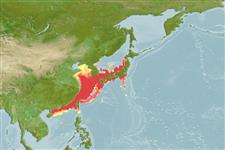Environment: milieu / climate zone / depth range / distribution range
Ökologie
seewasser benthopelagisch; tiefenbereich 0 - 370 m (Ref. 54713). Tropical; 42°N - 19°N, 111°E - 141°E (Ref. 54713)
Western Pacific: Japan and the East China Sea. Reported from Hong Kong (Ref. 12083).
Length at first maturity / Size / Gewicht / Alter
Maturity: Lm ?, range 15 - ? cm
Max length : 30.0 cm TL Männchen/unbestimmt; (Ref. 2272)
Rückenflossenstacheln (insgesamt): 6 - 7; Rückenflossenweichstrahlen (insgesamt): 27-33; Afterflossenstacheln 3; Afterflossenweichstrahlen: 24 - 28. Body whitish ; in young it is pale brown or blackish brown. Spines of dorsal fin short, not separated from soft-rayed portion (Ref. 41299).
Juveniles are associated with jellyfish, and can occur in small groups. Adults become bottom-dwellers (Ref. 128523). Tasty food fish (Ref. 559).
Life cycle and mating behavior
Geschlechtsreife | Fortpflanzung | Ablaichen | Eier | Fecundity | Larven
Bykov, V.P., 1983. Marine Fishes: Chemical composition and processing properties. New Delhi: Amerind Publishing Co. Pvt. Ltd. 322 p. (Ref. 4883)
IUCN Rote Liste Status (Ref. 130435)
Bedrohung für Menschen
Harmless
Nutzung durch Menschen
Fischereien: kommerziell
Mehr Information
PartnerBilderStamps, Coins Misc.LauteCiguateraGeschwindigkeitSchwimmstilKiemenoberflächeOtolithsGehirngrößeSehfähigkeit
Tools
Zusatzinformationen
Download XML
Internet Quellen
Estimates based on models
Preferred temperature (Ref.
123201): 11.1 - 23.2, mean 18.4 °C (based on 218 cells).
Phylogenetic diversity index (Ref.
82804): PD
50 = 0.5156 [Uniqueness, from 0.5 = low to 2.0 = high].
Bayesian length-weight: a=0.01413 (0.00860 - 0.02321), b=3.07 (2.93 - 3.21), in cm total length, based on LWR estimates for this species & (Sub)family-body (Ref.
93245).
Trophic level (Ref.
69278): 4.0 ±0.28 se; based on food items.
Widerstandsfähigkeit (Ref.
120179): mittel, Verdopplung der Population dauert 1,4 - 4,4 Jahre. (Assuming tm=1).
Prior r = 0.49, 95% CL = 0.32 - 0.73, Based on 1 stock assessment.
Fishing Vulnerability (Ref.
59153): Low to moderate vulnerability (27 of 100).
Climate Vulnerability (Ref.
125649): Moderate to high vulnerability (47 of 100).
Nutrients (Ref.
124155): Calcium = 110 [63, 258] mg/100g; Iron = 1.09 [0.59, 1.92] mg/100g; Protein = 17.3 [15.5, 19.2] %; Omega3 = 0.231 [0.119, 0.434] g/100g; Selenium = 87 [40, 201] μg/100g; VitaminA = 26.7 [8.1, 99.1] μg/100g; Zinc = 0.935 [0.613, 1.413] mg/100g (wet weight); based on
nutrient studies.
